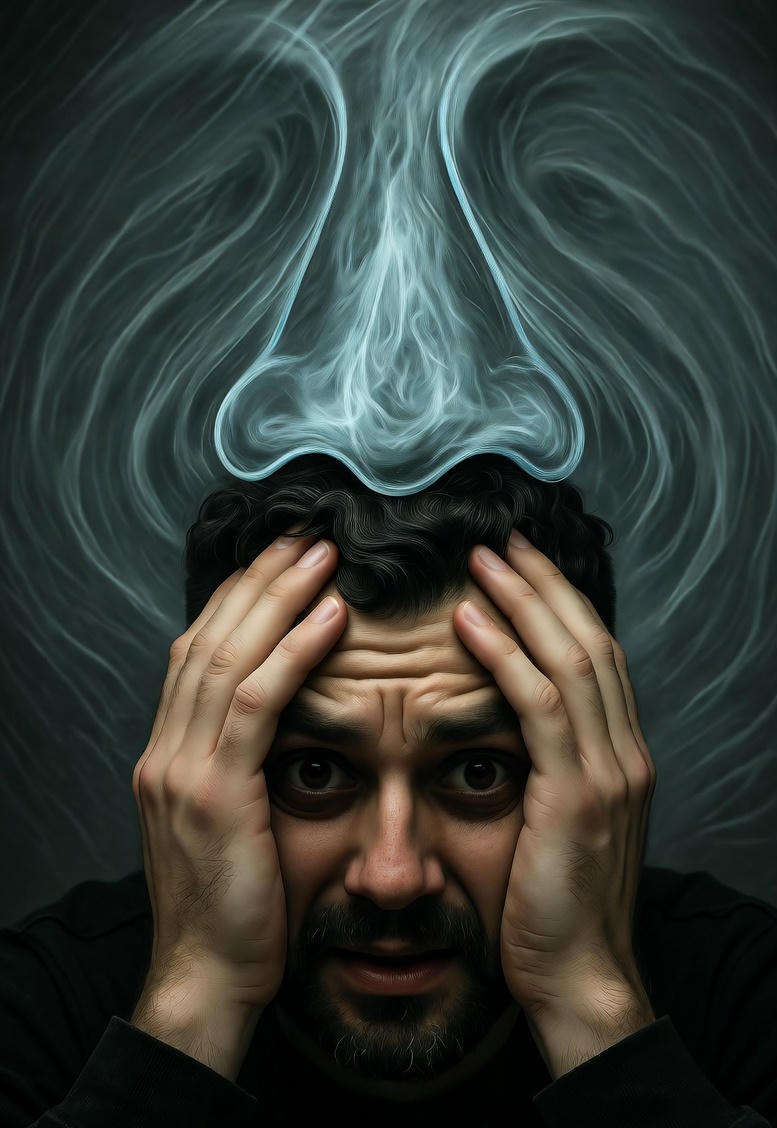Cognitive and Psychological Symptoms of Empty Nose Syndrome: A Physiological Perspective

A lot has been said about the cognitive and psychological symptoms that can come with empty nose syndrome (ENS). Friends and family often have a hard time understanding what’s going on. Family doctors or other specialists might see the anxiety, depression, or brain fog and assume that mental illness has developed. Even ENTs who believe ENS is real may not fully understand why these symptoms happen.
As someone who has lived with ENS for fourteen years, I’d like to share my perspective on what I think is really going on. The common explanation is that these symptoms are a reaction to the emotional stress of living with ENS — that patients simply have trouble coping. Research papers often talk about “comorbidities” developing alongside the condition. Some skeptics go as far as suggesting that ENS is caused by mental illness!
But I’ve come to believe something different. I think most of these cognitive and psychological symptoms are actually physiological responses to the changes in breathing caused by ENS — not just psychological reactions. There’s no doubt that living with ENS is emotionally difficult, but I don’t think that’s the main reason people develop these symptoms.
Here are a few of the things I believe play a role:
Shallow Breathing Due to Reduced Nasal Resistance
Many ENS patients notice that breathing feels too open, with very little resistance. That was one of the first things I noticed, and I later had it confirmed through testing at Ohio State University. When nasal resistance is too low, breathing becomes shallow — it’s hard to take or hold a deep breath. Constant shallow breathing can have negative effects on the brain and mood. There’s a reason therapists use deep breathing exercises to calm people — breathing deeply helps regulate the nervous system.Loss of Airflow Feedback to the Central Nervous System
One of the hardest parts of ENS, mentally, is the loss of airflow sensation. It can feel like suffocating, even when air is moving freely. But I think it’s more than just a feeling — the lack of sensory feedback to the brain might directly affect how the brain regulates breathing and mood. Losing that signal could be part of why ENS patients often show signs of limbic system overactivation — the brain’s emotional alarm center.Sleep Disruption
Many people with ENS have trouble sleeping, and I think that’s connected to the shallow breathing, lack of airflow feedback, and limbic activation. In sleep science, it’s well known that poor or fragmented sleep can lead to psychological symptoms. REM sleep, in particular, is critical for mental balance. When sleep is disrupted for long periods, it can lead to serious emotional instability.- Association Between Autonomic Dysfunction and Empty Nose Syndrome, 2025
- Utility of Serum Interleukine-6 Level in Empty Nose Syndrome, 2023
- Suicidal thoughts in patients with empty nose syndrome, 2022
- Mental health burden of empty nose syndrome compared to chronic rhinosinusitis and chronic rhinitis, 2022
- The Degree of Stress in Patients With Empty Nose Syndrome, Compared With Chronic Rhinosinusitis and Allergic Rhinitis, 2021
- The functional and psychological burden of empty nose syndrome, 2018
- Sleep impairment in patients with empty nose syndrome, 2023
- Identifying Obstructive Sleep Apnoea in Patients with Empty Nose Syndrome, 2022
- Impact of sleep dysfunction on psychological burden in patients with empty nose syndrome, 2022
- Postoperative Sleep Outcomes in Empty Nose Syndrome: Associations With Psychiatric Symptomatology, 2025
- Depression and anxiety in empty nose syndrome: A systematic review and Meta-analysis, 2025
- Identifying Residual Psychological Symptoms after Nasal Reconstruction Surgery in Patients with Empty Nose Syndrome, 2023
- Serum High-Sensitivity C-Reactive Protein Is Associated with Postoperative Psychiatric Status in Patients with Empty Nose Syndrome, 2021
- Impact of Psychologic Burden on Surgical Outcome in Empty Nose Syndrome, 2021
- Nasal nitric oxide in relation to psychiatric status of patients with empty nose syndrome. 2019
- What drives depression in empty nose syndrome? A Sinonasal Outcome Test-25 subdomain analysis, 2019
- Evaluation of depression and anxiety in empty nose syndrome after surgical treatment, 2016
- The clinical effect of psychosomatic interventions on empty nose syndrome secondary to turbinate-sparing techniques: a prospective self-controlled study, 2021
- Treating empty nose syndrome as a somatic symptom disorder, 2015
- Empty nose syndrome: what are we really talking about?, 2009
In my own case, my sleep problems worsened after a nasal vestibular body reduction. My daytime breathing drive weakened, and I often have to consciously initiate breaths to avoid hypoventilating. A sleep study later showed frequent spontaneous arousals, though no one could explain why. Unfortunately, I couldn’t find a sleep specialist willing to investigate further. Over time, these sleep problems began affecting my overall health — including my blood pressure and metabolism. Interestingly, hyaluronic acid (HA) injections, which increase nasal resistance, improved my sleep somewhat, suggesting that low nasal resistance is part of the issue.